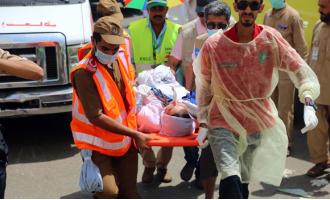Mina, Sep 24: An Indian man was among at least 717 people killed and over 860 others injured in a stampede today when Hajj pilgrims jostled their way to perform symbolic stoning of the devil here, marking the culmination of the annual pilgrimage.
 At least two Indian pilgrims were among the injured in the tragedy, the second worst to occur in 25 years during the world's holiest Muslim pilgrimage.
At least two Indian pilgrims were among the injured in the tragedy, the second worst to occur in 25 years during the world's holiest Muslim pilgrimage.
A sudden surge in the number of pilgrims heading to Jamarat for symbolic stoning of the devil by throwing pebbles against three stone walls resulted in the stampede at 9 AM local time (1130 IST).
The state-run Saudi Press Agency said the stampede occurred at the intersection of two streets leading to Jamarat, about five kilometres from Makkah.
The Saudi civil defence authority said that 717 pilgrims from different nationalities were killed and 863 others were injured.
It was not immediately clear what caused the stampede, the second worst after 1990 when 1,426 pilgrims were killed in a stampede inside a tunnel leading to holy sites.
The Indian Consulate in Jeddah said there were no reports of any Indian being killed in the stampede so far. However, two Indians from Assam were injured and have been admitted to hospital.
A man from Kerala identified as Mohammed from Kodungaloor in Thrissur district was among the pilgrims killed in the incident, Kerala's Rural Development and Non Resident Keralite Affairs (NORKA) Minister K C Joseph said in Thiruvananthapuram.
The deceased had gone for the Haj through a privately- sponsored group, he said. A woman from the state was among those injured, he added.
Indian Hajj mission doctors were deployed in all government hospitals in Mina and Makkah to ascertain if there were any Indian casualties, the Consulate said in a statement adding it was continuously monitoring the situation. It said that the tents in the affected area are occupied by pilgrims from Africa and Arab countries.







Comments
Add new comment